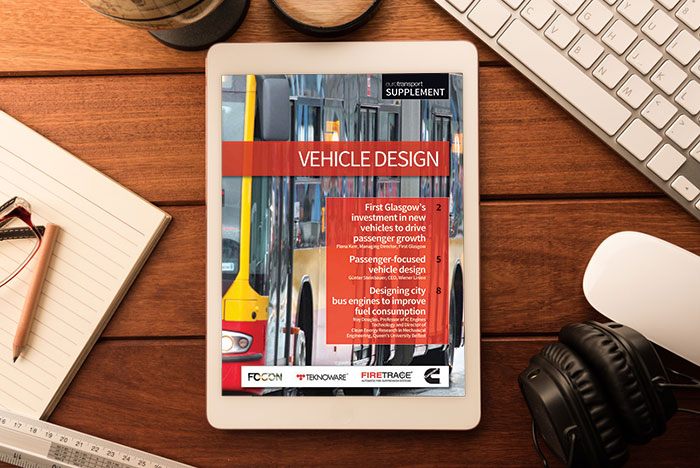Vehicle Design supplement 2013
- Like
- Digg
- Del
- Tumblr
- VKontakte
- Buffer
- Love This
- Odnoklassniki
- Meneame
- Blogger
- Amazon
- Yahoo Mail
- Gmail
- AOL
- Newsvine
- HackerNews
- Evernote
- MySpace
- Mail.ru
- Viadeo
- Line
- Comments
- Yummly
- SMS
- Viber
- Telegram
- Subscribe
- Skype
- Facebook Messenger
- Kakao
- LiveJournal
- Yammer
- Edgar
- Fintel
- Mix
- Instapaper
- Copy Link
Posted: 17 December 2013 | Intelligent Transport | No comments yet
First Glasgow’s investment in new vehicles to drive passenger growth
Passenger-focused vehicle design
Designing city bus engines to improve fuel consumption


- First Glasgow’s investment in new vehicles to drive passenger growth
Author: Fiona Kerr, Managing Director, First Glasgow
Underlining its commitment to customers, First Glasgow, Scotland’s biggest bus company, has significantly strengthened its fleet with investment in more than 150 single-deck buses. The investment is part of First Glasgow’s drive to improve its product and deliver passenger growth. Since November 2012, First Glasgow has invested £25 million in 151 new vehicles… - Passenger-focused vehicle design
Author: Günter Steinbauer, CEO, Wiener Linien
The development of rail-borne vehicles is and will remain a very technical task driven by engineering considerations. In the final analysis, their design is not only a question of comfort but primarily a question of safety for passengers and drivers. The processes leading up to the successful roll-out of a rail vehicle for urban transport services are based on decades of experience and defined by a great number of rulebooks and the work of supervisory authorities. Today’s passengers may board a tramway or metro car without hesitation. The risk of them being injured is virtually zero. Relevant traffic safety statistics show that public transport in Vienna is five times safer than motorised private transport… - Designing city bus engines to improve fuel consumption
Author: Roy Douglas, Professor of IC Engines Technology and Director of Clean Energy Research in Mechanical Engineering, Queen’s University Belfast
TERS (Thermal Energy Recovery System) is a three-year collaborative project funded by the Technology Strategy Board (TSB) and Invest Northern Ireland with the aim of reducing CO2 emissions and improving fuel consumption in city buses through capture and reuse of waste heat, or thermal energy recovery, from the bus engine…
This Vehicle Design supplement is restricted - login or subscribe for free to access
Thank you for visiting our website. To access this content in full, you'll need to login or subscribe.
It's completely free to subscribe, and in less than a minute you can continue reading. If you've already subscribed, just login.
Why subscribe? Join our growing community of thousands of industry professionals and gain access to:
- Quarterly issues in print and/or digital format
- Case studies, whitepapers, webinars and industry-leading content
- Breaking news and features
- Our extensive online archive of thousands of articles and years of past issues
All for free!
Click here to Subscribe today Login here
Related topics
Fleet Management & Maintenance
Issue
Issue 6 2013
Related organisations
Belfast, Cummins, Firetrace International, First Glasgow, FOCON, Teknoware, Wiener Linien
Related people
Fiona Kerr, Günter Steinbauer, Roy Douglas








